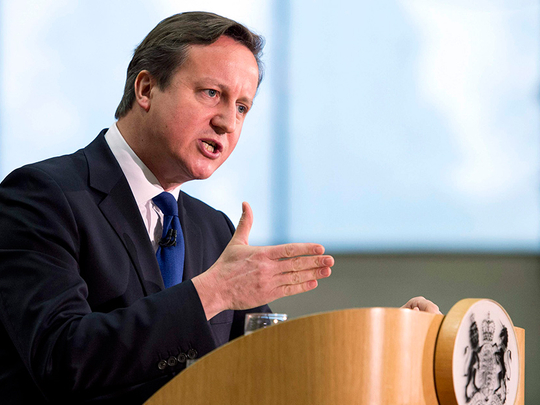
London: Prime Minister David Cameron on Friday promised tough curbs on welfare for EU migrants to counter a surge in arrivals and warned failure to get his way could be a deal-breaker for Britain staying in Europe.
He said the package of reforms would require changes to European Union treaties, but said he was “confident” that he could reach agreement with fellow EU leaders.
In a long-awaited speech on the issue, Cameron stopped short of calling for a cap on new arrivals or a mooted “emergency brake”, which had caused consternation in EU capitals.
But he announced plans to make EU workers wait four years to receive in-work benefits such as tax credits and social housing, and vowed to stop migrants claiming benefits for children who were living elsewhere in Europe.
Cameron is under intense pressure to tackle rising immigration, which has become a major issue of voter concern ahead of the May 2015 general election.
His Conservative party is facing an electoral challenge from the UK Independence Party (Ukip), which advocates leaving the EU altogether as the only way to stop EU migration.
Cameron said the reforms were an “absolute requirement” of his attempts to renegotiate Britain’s membership of the bloc before holding an in-out referendum in 2017.
“There is no doubt that this package as a whole will require some treaty change and I am confident we can negotiate that,” he said.
Cameron says he wants Britain to stay in the European Union but has refused to say if he would campaign for an exit if he fails to achieve the reforms he wants.
He said on Friday: “If our concerns fall on deaf ears and we cannot put our relationship with the EU on a better footing, then of course I rule nothing out.”
Reports last month that Cameron was considering a cap on EU workers were condemned by the European Commission, and German Chancellor Angela Merkel was reported to have warned him not to challenge a fundamental EU principle.
Cameron reportedly briefed Merkel on his speech beforehand and indicated he had heard the warnings, saying the freedom of movement was “key to being part of the single market”.
‘Real concerns’
But he added: “I say to our European partners — we have real concerns. Our concerns are not outlandish or unreasonable. We deserve to be heard, and we must be heard.”
Cameron’s bid to restrict benefits won a boost last month when the European Court of Justice ruled that states are not obliged to pay non-contributory social benefits to migrants who are not working and do not intend to.
The Open Europe think tank says that unusually in the EU, Britain’s in-work benefits, including tax credits which top up the wages of the low paid, qualify as non-contributory.
In a report published earlier this week, it suggested that restricting these would reduce the financial incentive for EU migrants to work in Britain.
But a study earlier this month found that EU immigrants to Britain paid more in taxes than they received in benefits over the last decade.
The report by academics at University College London found that EU migrants contributed a net £20 billion (Dh115 billion) to the public purse between 2001 and 2011.











